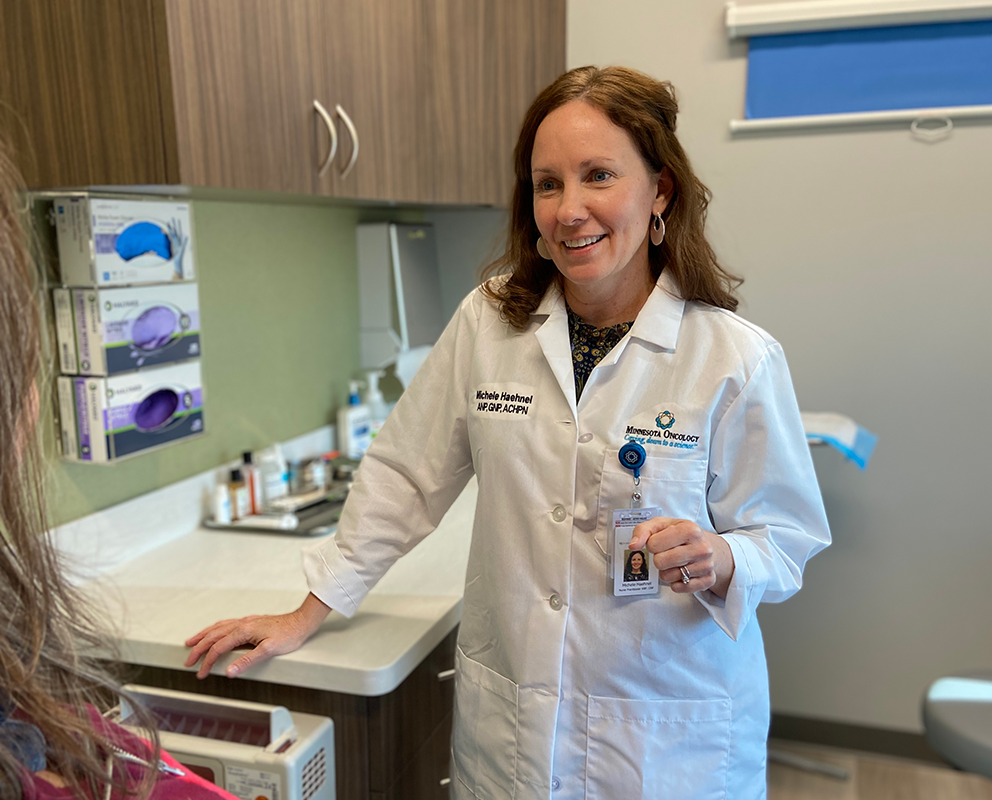If you have been diagnosed with cancer you may need care from a variety of medical specialists ranging from surgeons, radiation oncologists, medical oncologists, or a variety of other healthcare specialists. The process of navigating this process can be overwhelming for a cancer patient and their family.
Minnesota Oncology's board-certified physicians and staff specialize in:
Medical oncologists are physicians who have expertise in treating cancer patients with chemotherapy. These physicians commonly work closely with various specialties, including surgeons, radiation oncologists, primary care physicians, and other supporting services to coordinate the overall care of our cancer patients.
Due to tremendous advances in chemotherapy during the recent years, many cancers have become curable, especially when combined with surgery and radiation therapy. Potentially curable cancers include but not limited to germ cell tumor, Hodgkin's disease, certain types of lymphoma and leukemia, osteosarcoma, breast cancer, colon and rectal cancer, ovarian cancer, and small cell lung cancer. At the same time, supportive care for cancer patients has also become much better. Consequently, the side effects of chemotherapy are usually very manageable. Chemotherapy-induced nausea and vomiting has become an uncommon event. The need for hospital admission has declined. Many of our patients maintain a full work schedule while receiving chemotherapy.
Some of our patients are less fortunate and present with incurable diseases. Our goal then would be directed toward maintaining quality of life. Chemotherapy and other supportive measures are frequently used to relieve or prevent cancer related symptoms, such as pain, fatigue, weight loss, depression, activity level, and other aspects of quality of life. We do make a difference in our patients' life. Taking care of the terminally ill is an important duty.
The field of cancer medicine is constantly changing. New chemotherapeutic agents are being developed and our knowledge of optimal integration of chemotherapy, radiation therapy, and surgery is evolving. We are determined to make an even greater improvement in survival and quality of life for our cancer patients.
Your blood is made up of plasma, red blood cell, white blood cells and platelets, and has many functions. Not only does it bring oxygen and other nourishment to your body tissues and carry away carbon dioxide and other waste, it must also coagulate or clot when your tissues are injured. When something in your blood is not functioning correctly, you have a hematologic or blood disorder. Hematologists are physicians who study, diagnose and treat these disorders.
Some blood disorders may be malignant. At Minnesota Oncology, our hematologists are also board certified in medical oncology, with specialized training to treat cancers such as lymphomas and leukemias.
Diagnosis
If a hematologic disorder is suspected you will most likely require a blood test called a Complete Blood Count or CBC. This test evaluates a small drop of blood and provides the count of red blood cells, white blood cells and platelets. Your physician will also perform other blood tests used to measure enzymes and protein in the blood to evaluate the function of organs such as the thyroid and liver.
Because blood develops from stem cells found in your bone marrow, sometimes a sample of bone marrow must be examined to determine why blood cells are abnormal or why there are too many or too few of any kind. This sample is usually taken from the hip bone and the procedure takes about 30 minutes.
Treatment
Blood disorder treatments are as varied as the disorders themselves. Some disorders, such as anemia, can be controlled with diet and nutrition. Other blood disorders require more aggressive treatment such as chemotherapy, immunosuppressant drugs, growth factor drugs or bone marrow transplantation. Our hematologists use the latest therapies and technologies to treat all types of blood disorders.
We work closely with our radiation oncologists, pharmacists and other specialists to ensure comprehensive care of our patients. Our in-house laboratories provide quick test results for many routine blood and urine tests to help diagnose your disorder for appropriate treatment as soon as possible.
At Minnesota Oncology, we diagnose and treat many types of blood disorders, including:
Anemia
- Aplastic Anemia
- Hemolytic Anemia
- Iron Deficiency Anemia
- Megaloblastic Anemia
- Sickle Cell Anemia
- Other Hereditary Anemias
Blood Clotting Disorders
- Disseminated Intravascular Coagulation
- Hemophilia
Leukemias
- Acute Lymphotcytic Leukemia (ALL)
- Chronic Myelocytic Leukemia (AML)
- Acute Myelocytic Leukemia (AML)
- Chronic Lymphocytic Leukemia (CLL)
Lymphomas
- Hodgkin’s Diseases
- Non-Hodgkin’s Lymphoma
White Blood Cell Disorders
- Basophillic Disorders
- Eosinophillic Disorders
- Lymphocytic Disorders
- Lymphocytopenia
- Monocyte Disorders
- Neutropenia
- Neutrophillic Leukocytosis
- Hereditary Hemorrhagic Telangiectasia
- Thrombocytopenia
- Thrombophillia
- Von Willebrand’s Disease
Myeloproliferative Disorders
- Myelofibrosis
- Polycythemia Vera
- Thrombocythemia
- Multiple Myeloma
Disorders of Bone Marrow Function
- Sideroblastic Anemia
- Refractory Anemia
A radiation oncologist is a physician who specializes in using radiation to treat cancer. Treatment with radiation is provided by a team of radiation oncologists, dosimetrists, radiation therapists, and physicists.
Radiation therapy is the use of high-energy x-rays or radioactive materials to kill cancer cells. This radiation injures the cancer cells so that they can no longer continue to divide and multiply. Each treatment causes more cells to die, reducing the size of the cancerous tumor. Radiation therapy incorporates various techniques, including external beam and or internal radiation. The treatment is odorless and invisible.
Your oncologist will determine if your treatment plan will include radiation therapy. Radiation oncology is available at our St. Paul Cancer Center and Maplewood Cancer Center locations.
Learn more about Radiation Therapy Treatment Options.
Gynecologic oncology/pelvic surgery is a division of Minnesota Oncology comprised of six gynecologic oncologists/surgeons, one women's healthcare nurse practitioner and four physician assistants specializing in gynecologic oncology.
The primary focus is the diagnosis, treatment and management of female reproductive cancers which include malignancies of the ovaries, uterus, cervix, fallopian tubes, vagina and vulva. Our physicians are experts in gynecologic oncology surgeries; the administration and management of chemotherapy; and the indication for radiation therapy for gynecologic cancers.
Our providers also diagnose and treat pre-cancerous genital tract conditions and perform in-office colposcopies, endometrial biopsies, LEEP (Loop Electrocautery Excisional Procedure) procedures and laser surgery.
The reasons to undergo surgery for gynecologic cancer may include:
- Diagnosis (to determine if cancer is present)
- Staging (determine the extent of the cancer)
- Treatment (remove the cancer)
- Implant tools to help with chemotherapy or radiation
The most common area of surgery in gynecologic oncology is the abdomen.
To determine which surgical approach will be used, your physician will evaluate and consider the following:
- Goals of the surgery
- Patient’s health condition
- Size of the uterus or tumor that needs to be removed
- Type of surgery
Abdominal Surgery
Open Abdominal Surgery (Laparotomy)
This traditional surgical approach uses, as its name implies, a large incision (6-12 inches) to provide open access to the abdominal area.
- In cancer surgery, the incision is usually vertical (up and down)
- May be necessary for large masses/tumors
- May be necessary where exposure to the entire abdomen is required
- May be necessary when certain health/medical conditions exist
- It is most commonly performed for:
- Advanced-stage ovarian cancer surgery
- Removal of uterus or large tumors
- Other radical surgeries
Minimally Invasive Surgery (Laparoscopy with or without robotic assistance)
Minimally invasive surgical procedures are an alternative to open (invasive) surgery that allow for closed or local surgery with less trauma. These procedures involve the use of laparoscopic devices and remote-control manipulation of instruments with indirect observation of the surgical field through an endoscope or similar device.
- Multiple small incisions on the abdomen
- Camera is inserted into the abdomen to visualize the abdominal cavity
- Small instruments are used to perform the surgery
- Most commonly performed for:
- Uterine cancer staging
- Evaluation pelvic masses
- Early stage ovarian cancer
- Cervical cancer
- Fertility-sparing procedures
The Robotic Advantage
The gynecologic oncologists at Minnesota Oncology have extensive experience with minimally invasive surgery using the da Vinci® robotic system to treat gynecologic cancers. This technology allows for improved dexterity, visualization and control by the surgeon. Incorporating technology developed by NASA for the use of "robotic arms" in space, the da Vinci's robotic micro-instruments translate the precise movements of the surgeon's hands while filtering out even the slightest tremors. High-definition, scaled 3D imaging allows for optimal viewing and manipulation of sensitive nerves and tissues. Because of the additional advantages with robotic surgery, minimally invasive surgery can be performed in women who otherwise might not be candidates for standard laparoscopy.
Potential advantages of da Vinci® robotic surgery:
- Shorter hospital stay
- Less pain and scarring
- Less risk of infection, blood loss and fewer transfusions
- Faster recovery
- Quicker return to normal activities
Thoracic oncologists provide treatment, which often includes surgery, for patients with cancer of the lung, esophogus, mesothelioma or other cancers located in the chest.
If the cancer is in an early stage, surgery may be the primary treatment. If the disease is more advanced, patients may be treated with chemotherapy or chemotherapy and radiation therapy before surgery to reduce the amount of cancer first.
![]()









